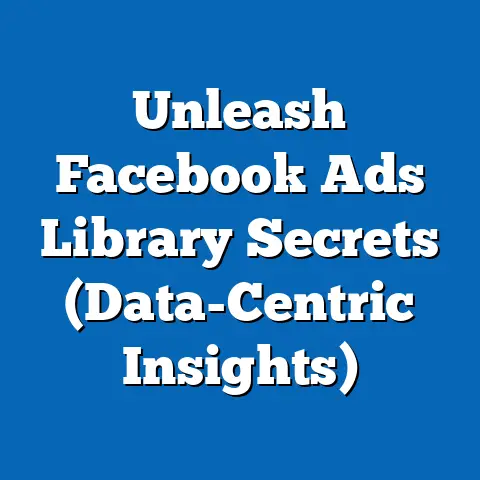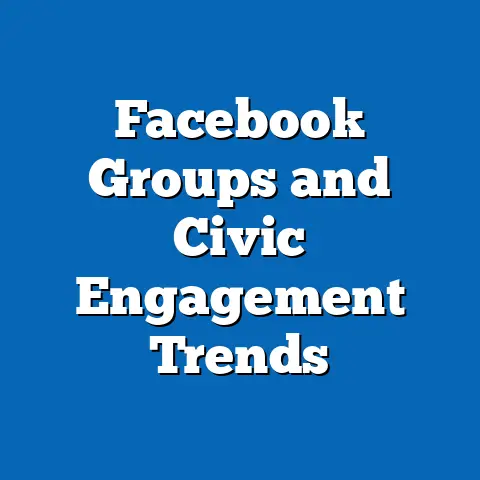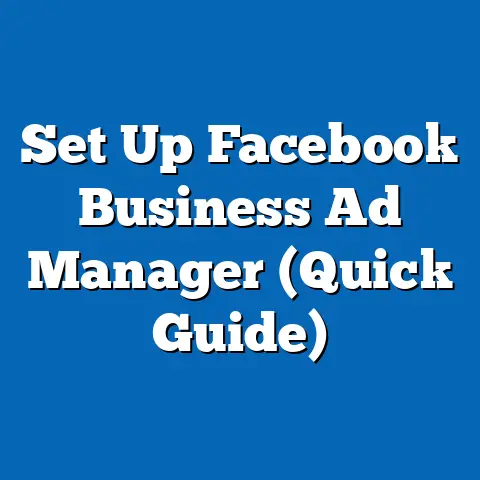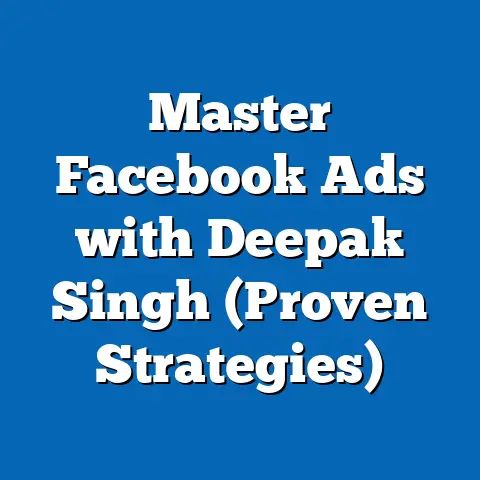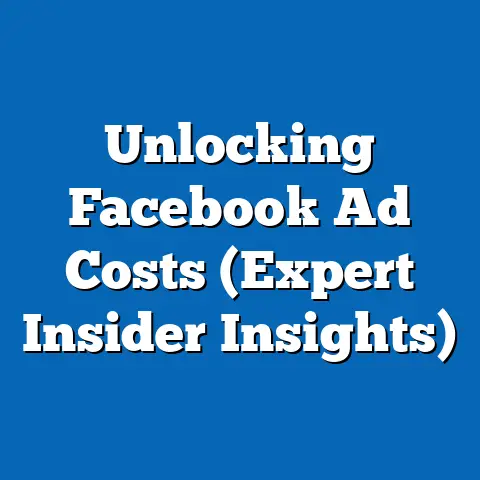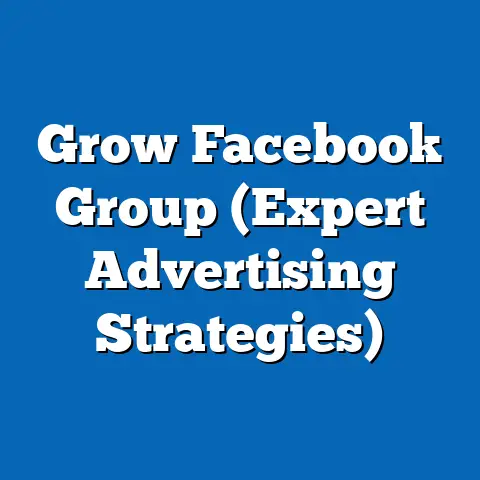Maximize Email Support for Facebook Ads (Expert Strategies)
In today’s fast-paced digital marketing arena, simply running Facebook ads isn’t enough.
We’re bombarded with messages, vying for attention, and it’s getting harder than ever to cut through the noise.
The secret weapon?
Combining the power of Facebook ads with personalized, effective email support.
It’s not just about blasting out generic messages; it’s about creating a seamless, engaging experience that nurtures leads and turns them into loyal customers.
I’ve seen firsthand how this synergy can transform a campaign from mediocre to phenomenal.
Digital marketing is constantly evolving, and businesses are waking up to the fact that integrating email support with their Facebook advertising strategies is no longer optional – it’s essential.
Think about it: someone clicks on your Facebook ad, intrigued by your product or service.
What happens next?
Do they land on a generic landing page and then…nothing?
That’s a missed opportunity.
By incorporating email support, you can continue the conversation, provide personalized information, and build trust.
Recent studies underscore this point.
I’ve read reports showing that businesses that combine email support with Facebook ads see significantly higher engagement rates, conversion rates, and customer satisfaction scores.
For example, a study by HubSpot found that segmented email campaigns, triggered by Facebook ad interactions, can generate up to 50% more leads.
These numbers speak volumes.
In this guide, I’m going to lay out expert strategies that will help you maximize your email support to enhance your Facebook ad performance.
We’ll dive deep into crafting effective email campaigns, leveraging automation, measuring success, and even look at real-world case studies.
Get ready to take your Facebook advertising to the next level!
Understanding the Synergy Between Email and Facebook Ads
The customer journey is rarely linear.
Someone might see your Facebook ad, browse your website, and then disappear.
Or they might add items to their cart and then abandon it.
That’s where email support comes in.
It’s the bridge that connects these touchpoints, guiding potential customers along the path to purchase.
Email support plays a crucial role in nurturing leads generated from Facebook ads.
It allows you to provide detailed product information, answer questions, and address any concerns that might be holding them back.
Think of it as a personalized concierge service, guiding each customer through their unique journey.
It’s about building relationships, not just making sales.
I’ve seen countless examples of how email can complement Facebook ad campaigns.
For instance, a clothing retailer might run a Facebook ad showcasing their new summer collection.
When someone clicks on the ad, they’re added to an email list.
Over the next few days, they receive a series of emails highlighting different pieces from the collection, offering styling tips, and even providing a special discount.
This multi-touch approach is far more effective than simply showing them a single ad and hoping they’ll buy something.
Consider a company selling online courses.
Their Facebook ad might target people interested in learning new skills.
When someone clicks, they’re offered a free introductory course in exchange for their email address.
This allows the company to nurture the lead with further information about their paid courses, testimonials from satisfied students, and exclusive offers.
Consumer behavior trends clearly indicate a preference for personalized communication via email, especially after interacting with Facebook ads.
People are more likely to engage with emails that are relevant to their interests and needs.
They appreciate being treated as individuals, not just another number in your database.
Takeaway: Email support is not an afterthought; it’s an integral part of a successful Facebook advertising strategy.
It allows you to nurture leads, build relationships, and guide customers along the path to purchase.
Crafting Effective Email Campaigns Aligned with Facebook Ads
Creating email campaigns that resonate with your Facebook ad audiences is an art and a science.
It requires a deep understanding of your target audience, compelling messaging, and a strategic approach to segmentation.
It’s not about sending the same generic email to everyone who clicks on your ad; it’s about tailoring your message to their specific interests and needs.
Segmentation is key.
Don’t treat all your leads the same.
Segment your audience based on their demographics, interests, behavior, and the specific Facebook ad they interacted with.
For example, someone who clicked on an ad for running shoes should receive different emails than someone who clicked on an ad for yoga mats.
Targeted messaging is equally important.
Your emails should speak directly to the interests and needs of each segment.
Use personalized language, address their pain points, and highlight the benefits that are most relevant to them.
For instance, an email to the running shoe segment might focus on performance, comfort, and injury prevention, while an email to the yoga mat segment might focus on quality, durability, and eco-friendliness.
Crafting compelling subject lines is crucial.
Your subject line is the first (and sometimes only) impression you make.
It needs to be attention-grabbing, intriguing, and relevant to the email content.
Avoid generic subject lines like “Newsletter” or “Update.” Instead, try something that sparks curiosity, creates a sense of urgency, or offers a specific benefit.
For example, “Last chance to save 20% on running shoes” or “5 ways to improve your running form.”
The email content itself should be concise, engaging, and visually appealing.
Use clear and concise language, break up text with headings and bullet points, and include relevant images or videos.
Make sure your call-to-action is clear and prominent.
Tell people exactly what you want them to do, whether it’s to visit your website, make a purchase, or download a free guide.
A/B testing is your best friend.
Don’t assume you know what works best.
Test different email formats, subject lines, and messaging styles to see what resonates most with your audience.
Use A/B testing tools to send different versions of your email to a small segment of your audience and track the results.
Then, use the winning version for the rest of your campaign.
Takeaway: Crafting effective email campaigns aligned with your Facebook ads requires segmentation, targeted messaging, compelling subject lines, engaging content, and A/B testing.
Leveraging Automation for Enhanced Email Support
Managing email support for Facebook ads can be overwhelming, especially if you’re running multiple campaigns.
That’s where automation comes in.
Automation tools can streamline the process of responding to inquiries, sending follow-up emails, and nurturing leads, freeing up your time to focus on other aspects of your marketing strategy.
Automation can streamline the process of responding to inquiries, sending follow-up emails, and nurturing leads.
Instead of manually sending each email, you can set up automated workflows that trigger based on specific actions or events.
For example, when someone clicks on your Facebook ad, they’re automatically added to an email list and receive a welcome email.
A few days later, they receive a follow-up email with more information about your product or service.
Effective automated email workflows can align with your Facebook ad campaigns.
A welcome sequence can introduce new subscribers to your brand and highlight your key offerings.
Abandoned cart emails can remind customers about items they left in their cart and encourage them to complete their purchase.
Customer feedback requests can gather valuable insights and improve your products or services.
Consider a software company that runs a Facebook ad targeting small businesses.
When someone clicks on the ad, they’re offered a free trial of the software in exchange for their email address.
This triggers an automated email workflow that includes:
- Welcome email: Introduces the company and highlights the key benefits of the software.
- Tutorial email: Provides a step-by-step guide on how to use the software.
- Case study email: Showcases how other small businesses have used the software to achieve success.
- Offer email: Provides a special discount on the paid version of the software.
Customer relationship management (CRM) systems are invaluable for tracking user interactions and optimizing email support.
CRMs allow you to track every interaction a customer has with your brand, from clicking on your Facebook ad to opening your emails to making a purchase.
This data can be used to personalize your email campaigns, identify your most engaged leads, and improve your overall customer experience.
Takeaway: Automation is essential for managing email support for Facebook ads.
It streamlines the process of responding to inquiries, sending follow-up emails, and nurturing leads.
CRM systems are invaluable for tracking user interactions and optimizing your email campaigns.
Measuring Success: Key Metrics for Email Support in Facebook Ads
You can’t improve what you don’t measure.
That’s why it’s essential to track the key performance indicators (KPIs) that indicate the success of your email support efforts in relation to your Facebook ads.
These metrics will provide valuable insights into customer behavior and preferences, allowing you to optimize your campaigns for better results.
- Open Rates: The percentage of people who open your emails.
A high open rate indicates that your subject lines are compelling and your audience is engaged. - Click-Through Rates (CTR): The percentage of people who click on a link in your email.
A high CTR indicates that your email content is relevant and your call-to-action is effective. - Conversion Rates: The percentage of people who take a desired action after clicking on a link in your email, such as making a purchase or filling out a form.
A high conversion rate indicates that your email is effectively driving results. - Customer Retention Rates: The percentage of customers who continue to do business with you over time.
A high retention rate indicates that your email support is building loyalty and fostering long-term relationships.
Analyzing these metrics provides insights into customer behavior and preferences.
By tracking open rates, you can see which subject lines resonate most with your audience.
By tracking click-through rates, you can see which email content is most engaging.
By tracking conversion rates, you can see which emails are most effective at driving results.
Setting up reporting systems is crucial for monitoring and adjusting strategies based on performance data.
Use analytics tools to track your KPIs and generate reports.
Regularly review these reports to identify areas for improvement and adjust your strategies accordingly.
For example, if you notice that your open rates are low, try experimenting with different subject lines.
If you notice that your conversion rates are low, try improving your email content or your landing page.
Takeaway: Measuring success is essential for optimizing your email support efforts in relation to your Facebook ads.
Track key KPIs such as open rates, click-through rates, conversion rates, and customer retention rates.
Analyze these metrics to gain insights into customer behavior and preferences, and use this data to adjust your strategies accordingly.
Case Studies of Successful Integration
Let’s look at a couple of real-world examples of brands that have successfully maximized their email support for Facebook ads.
Case Study 1: The E-commerce Fashion Brand
This brand used Facebook ads to target women aged 25-45 interested in fashion.
When someone clicked on their ad, they were added to an email list and received a welcome email offering a 10% discount on their first purchase.
Over the next few weeks, they received a series of emails showcasing their latest collections, providing styling tips, and announcing exclusive promotions.
Results:
- Increased website traffic by 30%
- Increased conversion rates by 15%
- Increased customer retention rates by 10%
Key Tactics:
- Personalized email campaigns based on customer interests
- Exclusive promotions for email subscribers
- High-quality product photography and styling tips
Case Study 2: The Online Education Platform
This platform used Facebook ads to target professionals interested in career development.
When someone clicked on their ad, they were offered a free webinar in exchange for their email address.
This triggered an automated email workflow that included:
- Reminder emails about the webinar
- A follow-up email with a recording of the webinar
- Emails showcasing their online courses
- Testimonials from satisfied students
Results:
- Increased lead generation by 40%
- Increased course enrollment by 20%
- Improved brand awareness and credibility
Key Tactics:
- Free webinars to generate leads
- Automated email workflows to nurture leads
- Testimonials from satisfied students to build trust
Takeaway: These case studies demonstrate the power of integrating email support with Facebook ads.
By personalizing your email campaigns, offering exclusive promotions, and providing valuable content, you can drive significant results.
Conclusion
Maximizing email support is no longer a “nice-to-have” – it’s a “must-have” for any business looking to succeed with Facebook advertising.
By understanding the synergy between email and Facebook ads, crafting effective email campaigns, leveraging automation, and measuring your results, you can take your campaigns to the next level.
Remember, it’s not just about sending emails; it’s about building relationships, providing value, and guiding your customers along the path to purchase.
I encourage you to implement these expert strategies in your own marketing efforts.
Start by segmenting your audience, crafting compelling email content, and setting up automated workflows.
Track your results, analyze your data, and adjust your strategies accordingly.
With a little effort and attention to detail, you can unlock the full potential of email support and achieve better results with your Facebook advertising.
Now go out there and make it happen!

